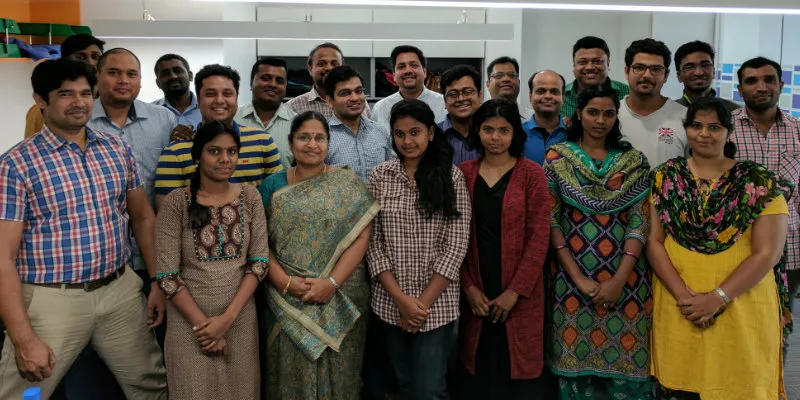Bengaluru-based Qbera comes to the rescue of salaried borrowers not covered by banks
Qbera, which has received over 5,000 personal loan applications since its launch in January, plans to disburse collateral-free loans worth Rs 150 crore to salaried individuals at interest rates starting at 14 percent.
Thirty-three-year-old Aditya Kumar always had a keen interest in investment banking. After getting his undergraduate degree in economics from the University of Warwick in the UK followed by a postgraduate degree in real estate investment from Cass Business School, London, he went on work for three three years at Lehman Brothers’ London office in commercial mortgage-backed securities (CMBS) and investment banking roles.
This stint in the banking ecosystem exposed him to the multiple kinds of customers and their loan requirements. What caught his attention was the challenges salaried individuals faced in availing unsecured personal loans, and he went on to launch Qbera in January 2017 to cater to this under-served section.

Aditya managed to stave off a fund crunch by raising $0.5 million in seed funding and attracting technology investment from the partnership with LendFoundry, a California-based fintech marketplace.
A quick and hassle-free personal loan
Borrowers can visit Qbera’s website and complete their loan applications, following which they receive instant loan offers. After this comes the process of collecting the documents that banks require for loan disbursal. The loans, according to the startup, are disbursed within 24 hours.
The interest rates start at 14 percent which translates into an EMI of Rs 3,418 per lakh (for three years). Qbera offers personal loans to borrowers with CIBIL scores of more than 600, with its focus on individuals earning upwards of Rs 20,000 a month. Qbera uses proprietary risk-management models to assess the creditworthiness of applicants, including first-time borrowers.
Aditya, who has worked on a variety of ventures in India, including two legacy businesses in the hospitality and garment industries after his time abroad, says,
“Besides the basic eligibility and credit bureau checks, we calculate multiple data points from a variety of data sources, including bank statement and history, employer categorisation and stability, demographic data and application, and device data. Additionally, for new-to-credit customers, we evaluate their social media profiles to further mitigate the risk of fraud.”
Loans to salaried employees
The platform offers personal loans to salaried employees of more than 7,00,000 companies. According to Aditya, more than 6,50,000 of these employers are not listed on banks' target lists, rendering their employees relatively ineligible for personal loans at traditional banks and NBFCs. Qbera has received over 5,000 personal loan applications since its launch. Borrowers can avail personal loans ranging between Rs 50,000 and Rs 5 lakh without the need for posting any collateral for a period of one to three years.
Qbera has partnered with RBL Bank to disburse loans. Before the official launch this year, the startup had processed 3,000 personal loan applications and aims to disburse upward of Rs 150 crore worth of loans in the next one year.
Harjeet Toor, Business Head – Retail and Small Business Lending, Credit Cards and Financial Inclusion, RBL Bank, says, “Retail banking in India is going through a rapid transformation due to the sharp thrust on financial inclusivity and digital technology. This has resulted in a dynamic change in consumer behaviour which is creating exciting opportunities across the banking spectrum.”
Based out of Bengaluru, Qbera has a team of 26 people. The startup is planning to reach 13 cities across India, including Kolkata, Cochin, Ahmedabad, Coimbatore, and Pune in six months, and launch operations in Chennai, Hyderabad, Mumbai, and Delhi/NCR by April.

Extending the lending market
Peer-to-peer (P2P) lending plays a crucial role in addressing the financial gaps in the country and minimises the constraints potential borrowers face in accessing faster and cheaper finance. In the first half of 2016, the space saw as many as 46 deals, amounting to $285 million.
The lending market, which until just a few years ago was just a few concepts strung together, now has a plethora of startups, with some of the biggest players being Finomena, Capital Float, Lendingkart, and Rubique. Capital Float raised Series B funding of $25 million last May, and Lendingkart too raised Series B funding amounting to $32 million.
There are other platforms like IndiaLends, P2P lending platform Faircent, and Kudos Finance and Investment. Platforms like EarlySalary and Khadkee focus on payday lending.
With so many entrants passionately seeking to change the complexion of consumer loans, the future of lending looks bright indeed.
Website: Qbera







